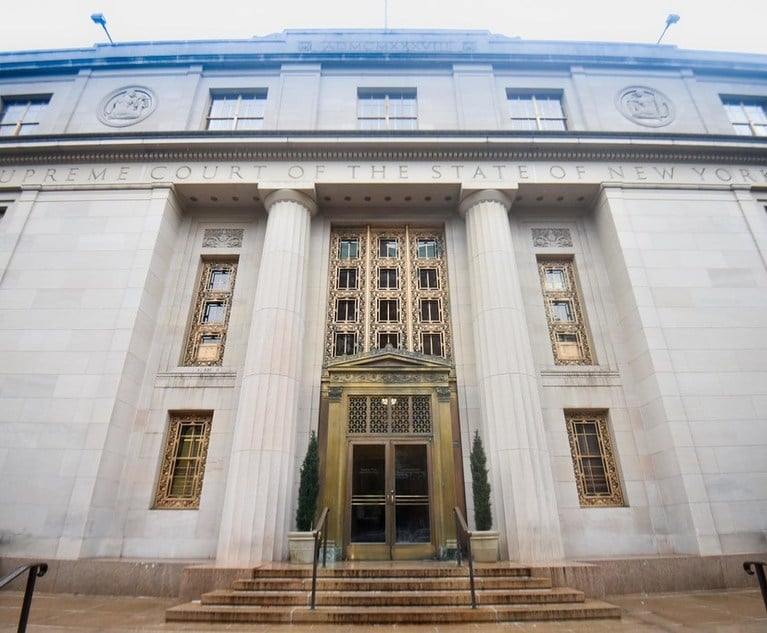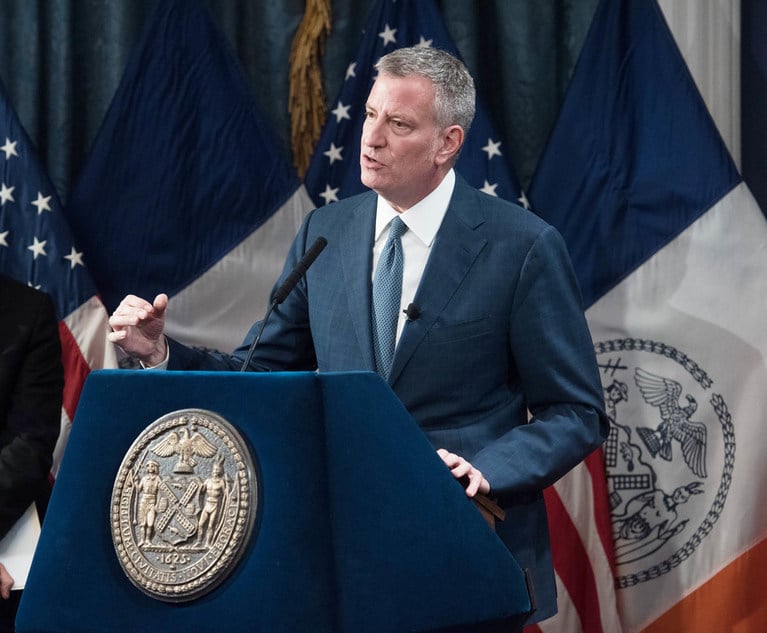 Jerry Goldfeder of Cozen O'Connor. Courtesy photo
Jerry Goldfeder of Cozen O'Connor. Courtesy photo NY Court of Appeals Weighs Mail-In and Non-Citizen Voting
"With the withdrawal of President Joe Biden and the nomination of Harris, there are those who question whether delegates originally pledged to Biden can vote for other candidates," writes Jerry H. Goldfeder.
July 30, 2024 at 02:00 PM
6 minute read
The dog days of summer have not halted an onslaught of election-related issues. The presidential election has reached warp speed, and several salient issues have already been raised.
Each state has a statute that places the names of the Democratic and Republican party presidential and vice presidential nominees on their general election ballot (or, to be more precise, presidential electors pledged to those candidates). The Republican convention ran smoothly, nominating its candidates with no opposition, suspense, or legal issues. And they did so in time to meet all the statutory deadlines for the November ballot. On the other hand, the Democratic Party's convention is in the third week of August this year (by tradition, the incumbent party goes second), which appeared to be too late for Ohio's statutory deadline of August 7. After some back-and-forth, Ohio changed its law to accommodate the late August nomination. This change is not unprecedented. Faced with an early September Republican convention in 2004, a number of states changed their laws to ensure President George W. Bush would be on their general election ballots. However, this election occurs in a much more partisan atmosphere. As a result, despite Ohio's accommodation, Democrats are nominating Vice President Kamala Harris during a virtual roll call in time for Ohio's original law—just in case the Buckeye state revises its law once again. So there shouldn't be any legitimate legal issue.
This content has been archived. It is available through our partners, LexisNexis® and Bloomberg Law.
To view this content, please continue to their sites.
Not a Lexis Subscriber?
Subscribe Now
Not a Bloomberg Law Subscriber?
Subscribe Now
NOT FOR REPRINT
© 2025 ALM Global, LLC, All Rights Reserved. Request academic re-use from www.copyright.com. All other uses, submit a request to [email protected]. For more information visit Asset & Logo Licensing.
You Might Like
View All
A Time for Action: Attorneys Must Answer MLK's Call to Defend Bar Associations and Stand for DEI Initiatives in 2025
5 minute read
Midlevel Appellate Court Reinstates New York's Voting Rights Act

Ex-NYC Mayor de Blasio Must Pay $475K Fine for NYPD’s Presidential Campaign Security
3 minute read
Read the Document: DOJ Releases Ex-Special Counsel's Report Explaining Trump Prosecutions
3 minute readLaw Firms Mentioned
Trending Stories
- 1Over 700 Residents Near 2023 Derailment Sue Norfolk for More Damages
- 2Decision of the Day: Judge Sanctions Attorney for 'Frivolously' Claiming All Nine Personal Injury Categories in Motor Vehicle Case
- 3Second Judge Blocks Trump Federal Funding Freeze
- 4Crypto Hacker’s $65 Million Scam Ends in Indictment
- 5Trump's Inspectors General Purge Could Make Policy Changes Easier, Observers Say
Who Got The Work
J. Brugh Lower of Gibbons has entered an appearance for industrial equipment supplier Devco Corporation in a pending trademark infringement lawsuit. The suit, accusing the defendant of selling knock-off Graco products, was filed Dec. 18 in New Jersey District Court by Rivkin Radler on behalf of Graco Inc. and Graco Minnesota. The case, assigned to U.S. District Judge Zahid N. Quraishi, is 3:24-cv-11294, Graco Inc. et al v. Devco Corporation.
Who Got The Work
Rebecca Maller-Stein and Kent A. Yalowitz of Arnold & Porter Kaye Scholer have entered their appearances for Hanaco Venture Capital and its executives, Lior Prosor and David Frankel, in a pending securities lawsuit. The action, filed on Dec. 24 in New York Southern District Court by Zell, Aron & Co. on behalf of Goldeneye Advisors, accuses the defendants of negligently and fraudulently managing the plaintiff's $1 million investment. The case, assigned to U.S. District Judge Vernon S. Broderick, is 1:24-cv-09918, Goldeneye Advisors, LLC v. Hanaco Venture Capital, Ltd. et al.
Who Got The Work
Attorneys from A&O Shearman has stepped in as defense counsel for Toronto-Dominion Bank and other defendants in a pending securities class action. The suit, filed Dec. 11 in New York Southern District Court by Bleichmar Fonti & Auld, accuses the defendants of concealing the bank's 'pervasive' deficiencies in regards to its compliance with the Bank Secrecy Act and the quality of its anti-money laundering controls. The case, assigned to U.S. District Judge Arun Subramanian, is 1:24-cv-09445, Gonzalez v. The Toronto-Dominion Bank et al.
Who Got The Work
Crown Castle International, a Pennsylvania company providing shared communications infrastructure, has turned to Luke D. Wolf of Gordon Rees Scully Mansukhani to fend off a pending breach-of-contract lawsuit. The court action, filed Nov. 25 in Michigan Eastern District Court by Hooper Hathaway PC on behalf of The Town Residences LLC, accuses Crown Castle of failing to transfer approximately $30,000 in utility payments from T-Mobile in breach of a roof-top lease and assignment agreement. The case, assigned to U.S. District Judge Susan K. Declercq, is 2:24-cv-13131, The Town Residences LLC v. T-Mobile US, Inc. et al.
Who Got The Work
Wilfred P. Coronato and Daniel M. Schwartz of McCarter & English have stepped in as defense counsel to Electrolux Home Products Inc. in a pending product liability lawsuit. The court action, filed Nov. 26 in New York Eastern District Court by Poulos Lopiccolo PC and Nagel Rice LLP on behalf of David Stern, alleges that the defendant's refrigerators’ drawers and shelving repeatedly break and fall apart within months after purchase. The case, assigned to U.S. District Judge Joan M. Azrack, is 2:24-cv-08204, Stern v. Electrolux Home Products, Inc.
Featured Firms
Law Offices of Gary Martin Hays & Associates, P.C.
(470) 294-1674
Law Offices of Mark E. Salomone
(857) 444-6468
Smith & Hassler
(713) 739-1250






